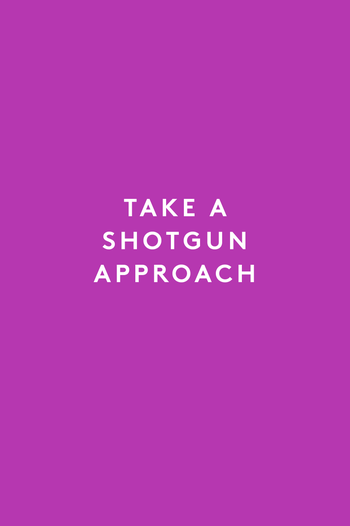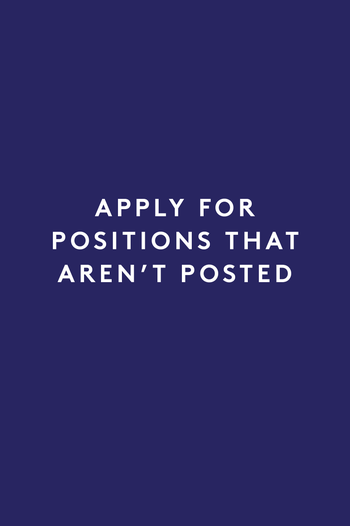 You know how there are some people who seem to effortlessly get interviews and get hired? They’re not just lucky. Chances are, they’ve made looking for a job an everyday priority — even when they’re perfectly content at the gig they’re already in.
You know how there are some people who seem to effortlessly get interviews and get hired? They’re not just lucky. Chances are, they’ve made looking for a job an everyday priority — even when they’re perfectly content at the gig they’re already in. Ahead, we talk to real women about how they sought (and scored) under-the-radar opportunities, snagged the attention of hiring managers, and even had jobs tailor-made for their skills. Try a few of these tips and get ready to add a new line to your LinkedIn profile.

Sign up for job updates on Glassdoor.com, LinkedIn, and other sites relative to your industry. Make sure you actually check your LinkedIn page (including the mailbox) at least once a week — a surprising number of recruiters and hiring managers use LinkedIn as part of their initial search, so you’re losing out if you’re profile hasn’t been updated since 2014.

Even if you love your job, you should take every interview that comes along. Preface the conversation by letting the hiring manager know you’re not necessarily looking to make a leap at this point in time, but admire their organization, and would love if they took the time to speak with you. If they’re in a time crunch, they may not take you up on the informational-interview offer. But if they do, you’re likely to get even more insight into your industry, and may find you do want to make a move after all. Think of it as establishing a longterm career connection. Plus, it’s always good to practice your interview skills.

Connect to coworkers on LinkedIn, follow a former boss on Instagram, and make sure to have casual check-ins every few months. For example, if they’ve recently had a baby, send a congratulatory card. Heard they got a promotion? Tweet your congrats at them. Then, when you’re ready to jump ship, a “are there any jobs available?” query won’t come out of the blue — and make them feel like you’re using them just to find a new gig.

Do you think of the HR office as the grownup equivalent of the principal’s office, a place that you only visit when you’re in trouble? Then you’re missing out on a ton of valuable insights. “I made a point to schedule bi-yearly meetings with HR,” explains Nicole, an editor. “They told me about opportunities within my company (a large corporation) I wouldn’t have known about and helped me transition up the ladder. HR is an amazing resource for finding out about new jobs the second they’re available, and I was shocked by how few colleagues utilized them.”

Your network is everyone in your contact list — because you never know who people know. “The two times I decided I needed an in-office job, because freelancing wasn’t cutting it, I sent out an email to everyone in my contact list,” explains Kathryn, a PR account manager. “I instantly got a few leads that resulted in jobs. Your network is a hugely powerful tool, and people want to help out.” Choose a specific subject line, like, “Looking for an immediate job in the PR Industry,” BCC everyone (this is key — do not just CC everyone and reveal your whole contact list to the world), include a brief paragraph or two explaining what you’re looking for, and see what turns up — you may be surprised. And if it isn’t applicable to them, they can delete with one click, no harm done.

Hearing that you haven’t gotten the gig is excruciating — but do not let it get you down. “I’d gotten a no from a dream job. I was disappointed, but I emailed the hiring manager letting her know I loved the company and to please keep me in the loop for future opportunities. Two months later, she got in touch with me for a slightly different position. It hurt to respond to the rejection email, but I know it helped me get my job in the long run,” says corporate recruiter Rebecca.

“As a hiring manager, I see so many people submit their résumé to one place, talk to one person, then wait to hear the answer. No, no, no! If you’re actively looking for a job, you should apply to as many places as possible,” explains Kyle, a web developer. You’re not “betraying” a job lead by looking for other opportunities. It’s a smart strategy, and the “worst-case scenario” — that you get two offers at the same time — is actually pretty amazing.

“I got a full-time job because I emailed editors expressing my interest in working at their magazine. Turns out, they had an opening they just hadn’t advertised yet. My interest put me ahead of the competition, and I landed a job,” says Diana, an editor. Think of this as a cover letter combined with the most grownup version of a fan letter: Explain why you want to work at the company, what draws you to it, and what you know you’d bring to the organization.

When you’re in job-hunting mode, make sure everyone in your network sees the best and brightest version of yourself. So many hiring managers agree: The person they least want to hire is the one who seems to want to get the eff out of their current position the most. You know they’re going to ask, so think of a positive spin on why you want to leave your job: You’ve grown so much, you want to explore more opportunities, you’re excited to lead a team…not that you hate your boss and cry in the bathroom stall on the regular.

Instead of waiting for job opportunities to come along, have a six-month, one-year and five-year plan. “I knew that I wanted to be at level X in five years, so at review time, I went to my manager, and said, 'How can I achieve this?'” says grants administrator James. “I realized that I needed to work on my public-speaking skills, which inspired me to take a Toastmasters class. I feel like taking the long view helps you realize just how many steps are needed to get where you want to be.”

If you really need a job ASAP, then make it known. Tell your barista, your partner’s parents, your doctor. You never know who may have a lead. “I have an hour-long commute, and I’ve found that talking to fellow commuters is a great way to get potential leads. One time, I had my laptop open, doing work, and a woman asked me about what I was doing. She was interested in the company I worked for, and, after an hour-long conversation, I actually recommended she speak to a hiring manager. She got an interview just from that conversation!”

Everyone wants to hear that they’ve done a good job or that they’ve been inspiring, so don’t worry about “bothering” someone. If you can find a contact, use it. “I went to a talk a few years ago and I really liked the guy giving the lecture, so I followed up with a random thank you email, and asked if I could chat [with] him more on the topic,” says Lindsey, 34, an editor. “When we got together for coffee, I had just been laid off, and he was very generous in offering advice. A few months later, a position at his company opened up, so I emailed him and ended up getting the job — all because I was gutsy enough to send a random email.”

Don’t be discouraged if an amazing interview is followed by radio silence. Hiring timelines can be weird, and sometimes, the reason you don’t hear back from a hiring manager is even they don’t know what’s going on with the position. Budgets are frozen, positions are shuffled, but a hiring manager knows a good candidate when she sees one. So check in, but also chill out.
Like what you see? How about some more R29 goodness, right here?
10 Easy Steps To Upgrade Your Résumé
How One Woman Is Selling Dildos To Pay For Her Wedding
How Much One NYC Woman Spends Over Valentine's Day Weekend